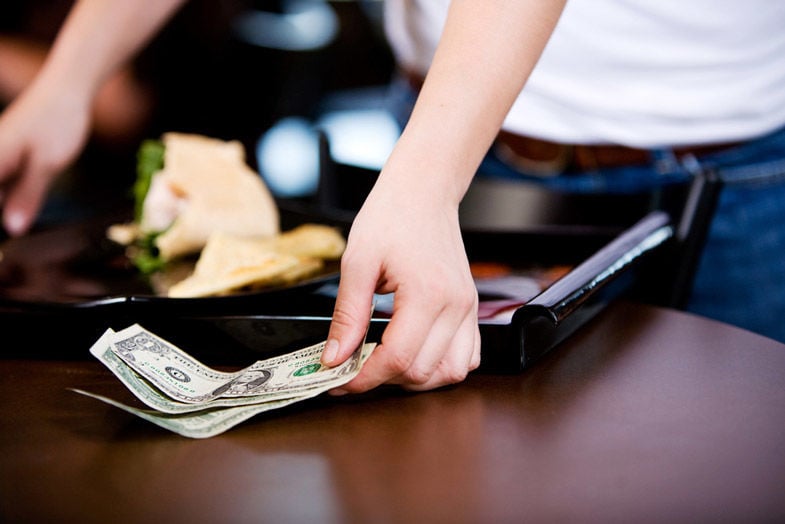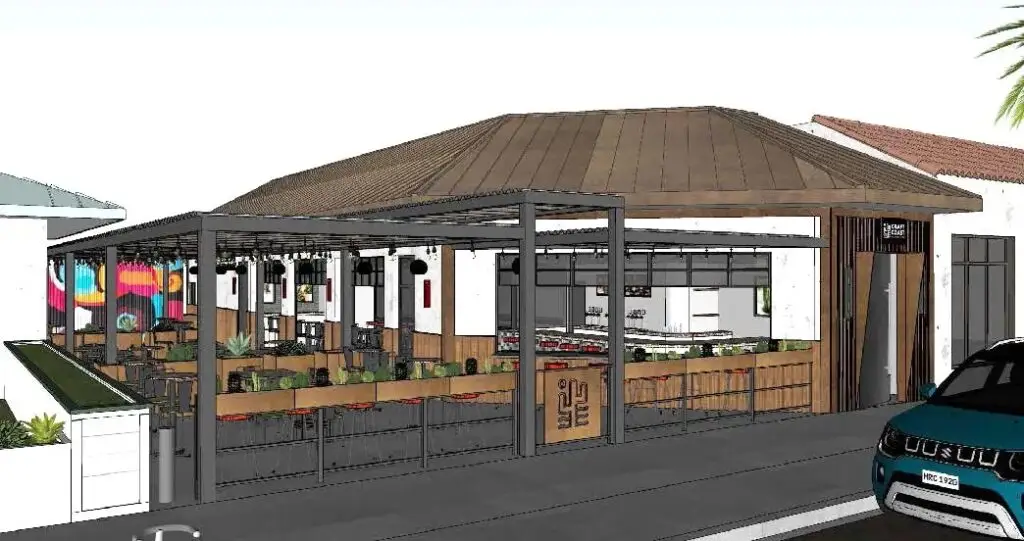NOTE: This blog post is about a work in progress. A sharing of exploratory, initial research. It is not meant as a fully formed opinion one way or the other in favor or opposition of the minimum wage. I simply wanted to share my findings as I go along and ask you readers to chime in as I attempt to reach an well-informed opinion.
I wouldn’t eat in restaurants for a while if I were Todd Gloria. Spit tastes gross.
Most restaurateurs I talk to are pretty outraged over Gloria’s proposed hike of the minimum wage to $11.50 in 2017. (This week mayor Kevin Faulconer vetoed it, but the city council is likely to override his veto.)
It’s a terribly complicated issue. I’m conducting dozens of interviews and reading hundreds of pages of research to try and formulate an educated opinion on it.
There’s no doubt that San Diegans need a living wage. To live in this city it helps to have a machine that prints money. Especially if you’re a line cook, dishwasher, prep cook or any other restaurant employee who doesn’t earn tips. The restaurant world has long had a gaping, odorous socioeconomic divide—and that divide is the door that goes from the dining room to the kitchen.
But higher-end restaurateurs are really ticked because many of their servers already make between $40,000 and $70,000 a year, often for part-time work.
Take this example. One local restaurateur had an employee make nearly $70K last year working 30 hours a week. That’s an hourly rate of about $45. I’m in the wrong career. Under Gloria’s current plan, the restaurateur would be forced to give that employee a $3.50/hour raise come 2017 (starting from June’s $8/hour minimum wage).
Restaurants already operate on small profit margins. Is it fair for the local government to force that restaurateur’s labor cost to raise by 44% for an employee who made eight times minimum wage last year?
Restaurants will cope with the minimum wage hike in various ways. They’ll hire less people. They’ll reduce hours of servers. They’ll assign 20 tables to one or two servers and wish them the best. They’ll install counters and buffets and robots. They’ll raise the menu prices. They’ll go out of business.
Chain restaurants with their economies of scale will be able to absorb the cost. Bistros will not.
Feel that? It’s the sky.
One of San Diego’s top restaurateurs/chefs, Matt Gordon, has estimated it will cost him hundreds of thousands of dollars. (Important note: Gordon does not object to paying back of the house staff more.)
Of course, proportionally, it will cost flower shop owners and Wal-Mart just as much as Gordon. Difference is, flower shop clerks and Wal-Mart checkers don’t make tips. They need the raise. Restaurant owners like Gordon provide an environment where his tipped servers do very, very well.
Granted, the $70K-a-year servers are outliers. Plenty of servers at chain restaurants eke out an existence barely above the poverty line. An $11.50 minimum wage would bring a full-time employee an extra $140/week (over the recent $8/hour minimum). That’s over $600 a month, a significant raise for some people. That’s rent in some shady neighborhoods. But, oh—the minimum wage might force restaurateurs to cut their hours to make up the costs. In that case no one wins.
So the question is: Is Gloria’s proposed legislation a blunt, one-size-fits-all instrument? An example of poorly designed, attention-grabbing legislation? Shouldn’t the plan take into consideration tipped employees who already make well above the minimum wage?
Hey, a solution! Count the tips as pay! If an employee’s tips don’t meet minimum wage, the restaurant owner makes up the rest. Bam, done!
Only, no.
California is one of only a handful of states where it’s illegal for employers to take a “tip credit”—meaning that tipped wages are counted in an employee’s pay. Under tip credit laws, most states only pay tipped employees $2.13 (the federal minimum), and tips help the employee earn minimum wage or greater.
The reason California doesn’t allow tip credits? Because there are bad people in the world. Wage theft is pretty rampant with tip credits. Some employers make servers clean ketchup bottles and do side-work for $2.13 an hour (work that obviously doesn’t get tipped). Lawsuits abound.
Plus, for every $70,000-a-year server in San Diego, there are many, many more who make $30,000 a year. A tip credit would cripple them. Whereas with a mandatory minimum wage, those employees could become more productive members of society with the extra $7,280 a year (how much a 40 hours/week employee would gain going from the recent $8/hour minimum wage to $11.50/hour).
So maybe a tip credit isn’t a great idea. Or at least not the tip credit law in its current format. California could be proactive and improve it.
Some restaurateurs are extolling the “total compensation” package—suggesting that what they shell out for healthcare, sick days, vacation days and staff meals should be credited as “pay” to an employee, too. That seems a touch extreme.
Maybe the onus to fix the impending restaurant problem shouldn’t fall on the government. The political machine, after all, is not famous for its intricate, proactive work. Maybe Gloria was right not to give special treatment to the restaurant industry. Maybe the current restaurant model is severely broken and needs to make a hard adjustment—and Gloria’s tough love is helping it see the light.
As it stands, we customers should be paying a lot more for restaurant food than we currently are. Americans are cheap-food addicts. Maybe restaurants need to raise their costs and build a more sustainable business model. The result will be that more people eat at home. Some restaurants will die. But maybe restaurant Darwinism isn’t such a terrible thing.
Or how about this. Let’s end tipping all together, as Slate and the New York Times have recently suggested. Study after study shows tipping has no affect on the quality of service. It promotes sexism, racism, ageism (a white, 30-something male almost always gets the best service, and well-endowed females almost always get the best server shifts). It promotes a for-sale servitude and encourages the worst parts of humanity to flourish.
Restaurants in Europe, Asia and Australia have got on just fine without tipping.
Former San Diego restaurant The Linkery got an incredible amount of hate mail for eliminating tipping and instituting an 18 percent “service” charge. The city attorney sued them (which seemed a touch crazy). Granted, The Linkery went under (owner Jay Porter is now up in Oakland operating a counter-service restaurant called The Half Orange, and opening a full-service restaurant called Salsipuedes). But maybe they were ahead of their time (to be historically correct, Alice Waters and Thomas Keller already had this practice in place at their restaurants). A few other restaurants around the country (Restaurant Riki in NYC, Brand 158 in L.A.) have started to do the same.
If only one San Diego restaurateur instituted an 18% tipping charge, chances are they’d get slaughtered. Diners would simply go to their competitor. It must be a collective, group decision by the top restaurants in San Diego to do it in lockstep.
I spoke to Porter about this issue. He wonders whether tipping may even be outlawed. “It’s an equality issue,” he says. “And equality issues are usually decided by courts.”
As it stands in my research now, here are the possible conclusions I’m leaning toward about the future of restaurants with an $11.50 minimum wage:
- Restaurateurs all across California will band together en masse and institute an 18-percent service charge. You’ll be able to tip more if you want.
- Further down the road, tipping will be eliminated in the U.S.
- Menu prices will go up to reflect the true cost of running a restaurant (most prices are currently far too low).
- You will begin to see a lot more counter-service and self-service restaurants, and far fewer full-service restaurants.
- Or… the fairly awful federal tip credit law that currently exists will be amended to prevent abuse, and instituted in California.
Like I said, I’m only beginning my dive into this issue. When I started the research for this story, I was sure I was going to lambast a one-size-fits-all ordinance that smacked of politicking and laziness. Now I’m not so sure.
One thing I’m sure of. Restaurateurs should be glad they’re not in San Francisco. Or Seattle.
More to come. Please feel free to chime in.

PARTNER CONTENT
Minimum Wage, Maximum Death!




















